GLYNN, Co. Antrim
Glynn War Memorial is located on the open space in the centre of Glynn village, at the junction of Main Road and Glenburn Road. The memorial is a very handsome obelisk, designed and erected by Mr T. Hastings, of Downpatrick, County Down. The side facing the main Belfast-Larne road bears the arresting inscription- “All ye who pass by remember with gratitude the men of Glynn, Maghermorne, and Raloo, who fell in the Great War.” Other sides of the memorial bear the names of the twenty-six men from the district who made the supreme sacrifice, viz.:-
Names of the FALLEN 1914 – 1918.
Robert Bodles, Able Seaman, s.s. Argus.
John B. Boyd, Private, 61st Canadian Expeditionary Force.
William Brown, Able Seaman, s.s. Pomeranian,
John Burns, Rifleman, 12th Royal Irish Rifles.
James McN. Carmichael, Private, 2nd Canadian Infantry.
William Carmichael, Private, 10th Canadian Machine Gun Corps.
James Clements, Captain, s.s. Gower Coast.
James Crawford, Private, Australian Expeditionary Force.
James Ferguson, Carpenter, s.s. Bray Head.
Martin Graham, Rifleman, 12th Royal Irish Rifles.
John Hill, batt. Signaller, 12th R Royal Irish Rifles.
John Hunter, Rifleman, 12th Royal Irish Rifles.
Charles McG. Johnston.
Randall W. McD. Johnston, Midshipman, Royal Navy.
William James Kirkcaldy, Private, Royal Army Medical Corps.
William McCluggage, Lieutenant, 12th Royal Irish Rifles.
William H. McCluggage, Rifleman, 12th Royal Irish Rifles.
James McConnell, Able Seaman, s.s. Argus.
James McKee, Rifleman, 12th R Royal Irish Rifles.
Robert Moore, Private, Highland Light Infantry.
Samuel Moore, Private, Canadian E Expeditionary Force.
John O’Neill, Rifleman, 12th Royal Irish Rifles.
Herbert Pike, Rifleman, 3rd Royal Irish Rifles.
John H. Shaw, Quartermaster-Sergeant, Canadian Expeditionary Force.
William Jas. Woods, Private, 10th Highland Light Infantry.
James Wright Private, Irish Guards.

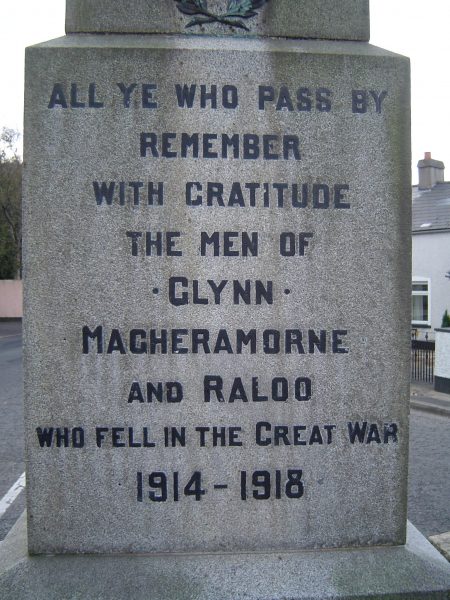
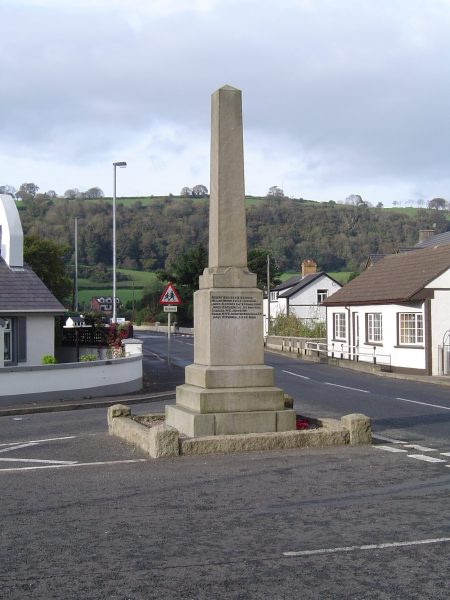
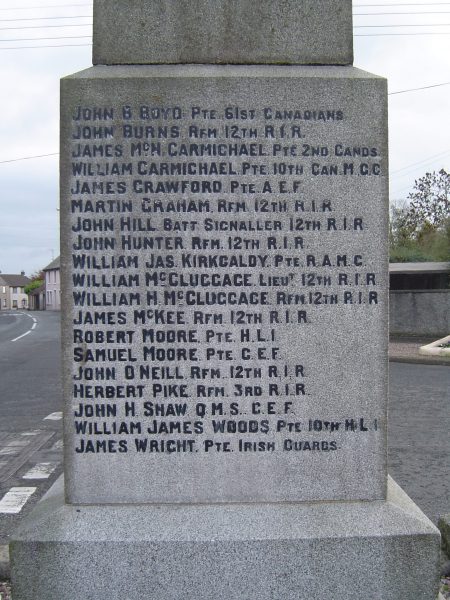
The Unveiling and Dedication Ceremony Great War.
On Sunday afternoon last [13th November 1921], Brigadier-General T.K.E. Johnston, C.B., unveiled, in Glynn village, a beautiful memorial to the men of Glynn, Maghermorne, and Raloo who had laid down their lives for their King and Country in the Great War. Unfortunately, what otherwise would have been a most impressive ceremony, was somewhat marred by a perfect deluge of rain, though the attendance under the circumstances were surprisingly large. The memorial is a very handsome obelisk, designed and erected by Mr T. Hastings, of Downpatrick, and erected on the open space in the centre of Glynn village, at the junction of the Main Road and Glenburn Road. The side of the pediment facing the main Belfast-Larne road bears the arresting inscription- “All ye who pass by remember with gratitude the men of Glynn, Maghermorne, and Raloo, who fell in the Great War.” The other sides of the pediment bear the names of the twenty-six men from the district who made the supreme sacrifice.
The erection of the memorial was in the hands of a united committee, composed of all the clergymen and several representative laymen of the districts named, and they certainly are to be cordially congratulated on the result of their work, and especially the Rev Robert Kirkpatrick, M.A., rector of Glynn, who acted as honorary secretary to the movement. The selection of General Johnston to unveiled the monument was a most appropriate one, for as heir to the Glynn estate he naturally has a keen interest in the district community, whilst his personal connection with the memorial lay in the fact that amongst the names inscribed thereon appear those of his only son and of a dearly-loved brother. His wife, sister, and brother, on Sunday, marked the dedication of the memorial by laying beautiful floral tributes at the base immediately after the “Last Post.”
Sunday’s ceremony commenced shortly after three o’clock, when there were about 500 assembled around the monument despite the downpour of rain. Led by a united choir, under Mr William Yeates precentorship, the hundredth Psalm was sung, and the Rev. J.T. Doherty (Maghermorne) led in prayer. After the singing of the well-known hymn, “O God, our help in ages past,” the Rev. C.H.L Buchanan, M.A. (Kilwaughter), read a proportion of Scripture, and the singing of the 124th Psalm preceded a short sermon by the Rev John Lyle Donaghy (First Larne Church).
AN ELOQUENT ADDRESS.
The preacher took as his text the words: “And David longed, and said, Oh, that one would give me to drink of the water of the well of Bethlehem, which is by the gate,” (2nd Samuel, xxiii., 15). In the course of his address, after referring to the incident recorded in his text, Mr. Donaghy said, “When David looked upon the sparkling clearness of water brought to him by his mighty men, it seemed to take on the colour of blood. It was the water of self-sacrifice, of self-devotion, and instead of using the result of all this self-sacrifice selfishly for himself, he dedicated it unto the Lord and used it for His worship and service. We today are in possession of some blood-bought heritages, because the young men of our Empire went in jeopardy of their lives-coloured for us the red blood of human sacrifice-and we ought to use them for the honour and the glory and the service of the Lord. Today we are in possession of a blood-bought heritage, the heritage of peace within the borders of our Empire. It is true to say that our Empire had to fight for its very existence, and it is true to say that it owes its existence to the men who fought and died for it in Flanders, on the bleak slopes of the Dardenelles, and in many another corner of the earth.
“It was but the day before yesterday that we celebrated Armistice Day, and the Editor of the ‘Belfast Evening Telegraph’ beautifully said- “Pride and grief, love and sorrow, were intermingled in the solemn services and acts which took place in every part of our far-flung Empire.’ ‘There was no Britisher,’ he said, ‘worthy of the name who did not feel the quickening of the pulses, as he thought of the mighty dead, that countless host, which sleeps its last long sleep where
In Flanders’ fields the poppies blow
Between the crosses, row on row,
and of those in the arid plains of Mesopotamia and beneath the ever-surging sea await the last trump.”
“I do not wish to harrow the feelings of the fathers and mothers and friends of the men whose names will, for generations to come, appear on the memorial about to be unveiled. To then, and others like them, we owe the heritage of freedom from human bondage. What will we do with it? Will we not dedicate it unto the Lord? Will we not make our Empire worthy of their sacrifice, worthy of the sacrifice of the men of this parish and province, many of them of our own kith and kin?”
“Will we not labour and do our utmost to push out glaring evils, such as the drink traffic, which dooms thousands of our population every year? Will we not labour thus to make this Empire which we love worthy of God’s blessing and the sacrifice made by our men for it? If we still cling to materialism and the lusts of the flesh, are we worthy of the sacrifices our gallant men have made? You are all citizens of this great Empire: will you make yourself worthy citizens? You are loyal to his Gracious Majesty the King, and the constitution of these realms; will you not also make yourselves loyal to the King of Kings, and have your citizenship also in heaven? Then will our best and bravest not have died in vain, and God, even our God, will bless us.”
The earth was sick with battle,
And she lay with paled face,
And garments rolled in blood,
An exile from the presence of her God,
Through all the heat and burden of the day.
And oh, that one would bring to me, she said,
While I in anguish wail,
Of the water of the Well of Paradise
That is beside the Gate.
A valiant man, full armed for the fight,
Burst thro’ the foeman with resistless might,
Not heeding that the Angel at the Gate
Did smite him sorely through with sword of light;
And brought again to earth,
What time the night fell late,
Of the water of the Well of Paradise,
Which is beside the Gate.
Meekly, with covered face and bended head,
He hath done matchless things for me, she said.
This water do I hold for this man’s blood;
I take the cup and drink and live to God.
UNVEILING AND DEDICATION.
On the invitation of Mr Donaghy, the monument was then unveiled by Brigadier-General Johnston, and the names of the fallen were read by the Rev Robert Kirkpatrick. The “Last Post” was impressively sounded by buglers of the Norfolk Regiment.
Addressing the congregation, General Johnston said he felt it a very great honour to be asked to unveil that memorial in the village of Glynn. It was a very difficult matter at a ceremony such as that to say what should be said, or to speak without emotion when so many parents and relatives were present to do honour to their dead. In the first place, he was sure they would wish him to congratulate Mr Hastings on the way in which he had carried out their commission. It was a memorial they would all be proud of, and he had no doubt the inhabitants of the village of Glynn would take every care of it. Human life was compassed by a few years. In a short time all there that day would have passed away, and none would remain to tell of the sacrifices by the Armed Forces of the Empire in the Great War; but that memorial would stand as a silent witness for generations, and passers-by as they read the names upon it would realise something of the sacrifices made by the Armed Forces of the British Empire. Let them never forget that their liberty that day had been bought as the price of the lives of three-quarters of a million of men. Let them see to it that they were worthy of those sacrifices, and never let it be said that their dead had died in vain. It was hard to be optimistic at the present time, especially in that country, where civil war had been ranging ; but he had every confidence in his fellow-countrymen, and was sure that whatever turned up they would “play the man.” He was glad to know there were so many ex-Service men there despite the weather, and he welcome them as men who had stood shoulder to shoulder on the field of honour with their beloved dead. In conclusion, he asked those present not to forget the bereaved. After all they were the greatest sufferers, for they would never see their dear ones again on earth.
Following the singing of the hymn, “For all the Saints,” the Rev. D. H. Hanson, B.A., C.B.E., offered up a touching delegation prayer, and the singing of the 66th paraphrase was followed by the pronouncing of the Benediction by Rev. Mr. Donaghy. Then the bugler sounded the “Reveille” while all stood at attention, and the National Anthem brought the service to an end.
Names of the FALLEN 1939 - 1945 and 1993.
John Craig, Royal Marines
Samuel Craig, Royal Ulster Rifles
Joseph Evans, Royal Air Force
William Hall, Royal Ulster Rifles
Joseph Hilditch, Royal Air Force
Alexander Mulholland, Merchant Navy
James Mulholland, Merchant Navy
John Murray, Merchant Navy
John Todd, Merchant Navy
Bosnia 1993
John Darrin Roche, Lance-Corporal, RIR.
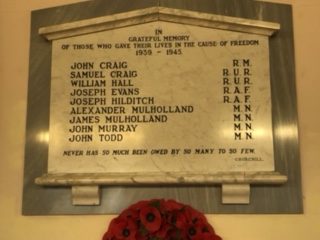
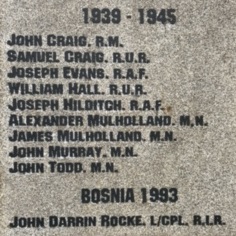

Many thanks to Alison Beggs for the two images above.
GLYNN HONOURS HER FALLEN WW2.
MEMORIAL UNVEILED
IMPRESSIVE CEREMONY.
When the call to war sounded In the dark days of 1939 from all parts of Ulster came men and women eager and willing to serve their King and country. County Antrim’s little village of Glynn sent, perhaps, more than her share, for over 50 of her sons and daughters answered that call, and of these nine failed to return.
On Tuesday evening honour was done to the fallen when a distinguished soldier-son of the district, Brigadier General R. C.A. McCalmont, C.V.O., C.B.E., D.S.O., D.L., unveiled in the Village Hall a war memorial tablet to their memory.
As was to be expected many from the district came to take part in the simple and moving ceremony, including relatives and friends of those whose names appear on the tablet.
Inscribed on the tablet are the words, “In grateful and loving memory of those who gave their lives in the course of freedom, 1939-45,” followed by the nine names and at the foot are Prime Minister Churchill’s famous words “Never has so much been owed by so many to so few.”
MAGNIFICENT RESPONSE.
Rev. R. Kirkpatrick, M.A., rector of Glynn, who presided, explained that the Glynn Victory Fund Committee had received such a magnificent response from ????????????????? following organizers of entertainments that after token gifts had been distributed to those who had served from the Glynn postal area, and to the relatives of the fallen, the Committee had decided with the residue of the funds, and with the consent of the trustees of the Village Hall, to place the memorial tablet there. It was placed there in grateful acknowledgement of the sacrifice made by those who served for the safety of so many.
Rev. John Begg, Old Presbyterian Church, Ballycarry, read from ch.vii v, 9-17, following which the hymn “Oh God our help in ages past” was sung.
Introducing General McCalmont, the chairman said they all remembered his father as the Member for that division. General McCalmont had served in the 1914-18 war andin recent years had done good work in Army Welfare.
General McCalmont prefaced his remarks by saying that it was a great honour and privilege for him to be asked to perform the unveiling ceremony in a place where his family had worshipped for so many years before the 1914-18 war.
He went on to say that it was rather a question who the right person to unveil a memorial should be, and he did not think anybody appreciated the honour more than someone like himself, who had seen his comrades give their lives, even if he himself had been fortunate enough to escape the risks of war.
RESPECT FOR MEMORIALS.
Everybody would agree, General McCalmont went on to say, that in every place there should be some permanent memorial, not only for the benefit of those whose family names appeared on it but also for the benefit of posterity. Already there were signs that some of the memorials of the 1914 war were not being respected as they ought, and yet it was a rather curious commentary that in the majority of places it was reported that the German Hun, no matter what else he might be, had had respect for the memorials of the last war.
It was a matter of pride and pleasure to him to see such a fine hall in the village of Glynn, and it was good that in that hall the memorial should be erected were it would be a constant reminder to the young, who, when they saw the names on it, would be inspired. It was all the more appropriate that the names were of those of Ulstermen who had fought as volunteers and not as conscripts. It was on that note that he would like to unveil the memorial, and he did so in the hope that it would be a consolation to those who had lost relatives and friends, and an inspiration to the youth of the future that if the need should arise again they would go and do likewise.
After the memorial had been uncovered with the dropping of the Union Jack, the Last Post and Reveille were sounded by Mr. William Clements, Larne, following which the tablet was dedicated by Rev. W. J. M‘Geagh, B.A., 1st Larne Presbyterian Church.
The company, who were standing, sang the hymn “Abide with me” and at the conclusion of which Mrs. Kirkpatrick placed a wreath of Flanders Poppies at the foot of the memorial.
A vote of thanks was passed to General McCalmont, moved by Mr. J. W. Pike and seconded by Mr. A. Burns, and following the Benediction by Rev. Mr. Kirkpatrick the National Anthem was sung.
The war memorial tablet consists of a polished white marble plate, on which the inscription is engraved. This rests on a moulded base and corbels. The background is of richly veined dove marble. The work was executed by Messrs. Hastings, sculptors, Larne and Downpatrick.
Larne Times December 5, 1946.
The text on this page has been created from newspaper archive content and it may contain typographical errors. If you can supply additional information, photographs of War Memorials in the nine counties of Ulster, or wish to report errors, broken links, make comments, suggestions, requests, etc. please email
uwms@outlook.com
All contributions will be acknowledged.
Research undertaken when time permits.